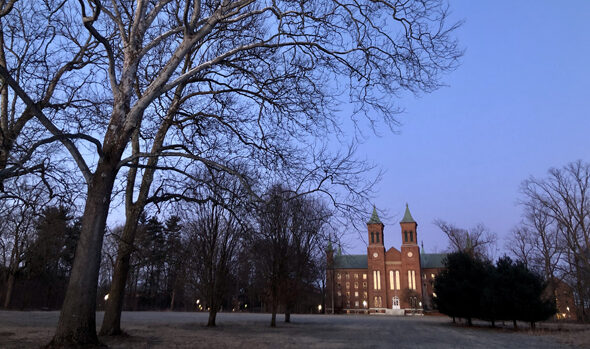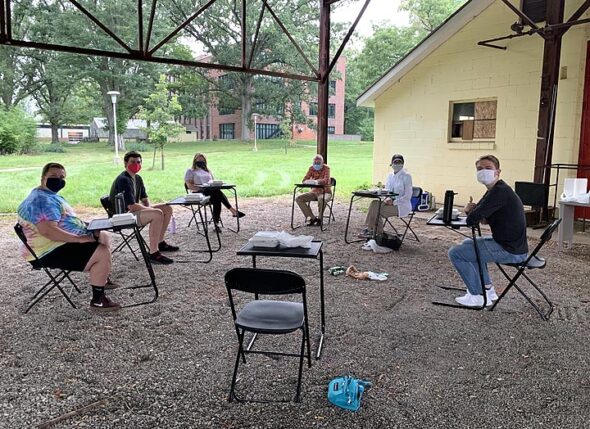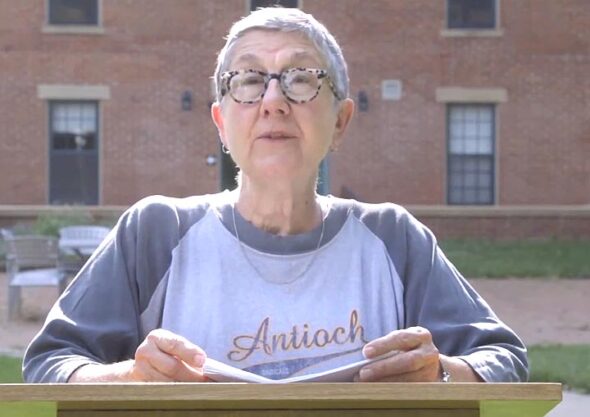
(Photo by Kathleen Galarza)
2020 Year in Review: Higher Education
- Published: January 9, 2021
Antioch College
In January, the News reported on Antioch College Works, a new approach to admissions and cooperative education at Antioch College. Under the program, Antioch commits to meeting the financial needs of all admitted students — including offering free tuition to Pell-eligible students — and providing expanded work opportunities during students’ time at Antioch and after graduation. According to college leaders, Antioch College Works is geared to increasing educational equity and boosting enrollment at the college, which hit a low of 27 in the fall of 2019. Launched in the fall of 2020, the program helped double entering enrollment, to 50 students.
In response to the COVID-19 pandemic, Antioch College closed its campus in mid-March, shifting the remainder of the winter term online, and continuing online for the spring term. The college also closed Glen Helen to the public in late March. Then, on April 3, Antioch enacted sweeping furloughs, pay cuts and hours reductions in a further response to pandemic-related financial losses. Around 27 staff, about one-quarter of the college’s workforce, were furloughed across all areas of the college, including eight Glen Helen employees. No faculty positions were furloughed. College leaders in April said they were unsure about the duration of the furloughs and whether layoffs would follow.
Pandemic-related closures and furloughs precipitated a crisis for one of Antioch’s most distinctive features: Glen Helen. The News reported extensively on the uncertain future of the nature preserve in a series of articles between April and June, including covering the efforts of the nonprofit Glen Helen Association, or GHA, to purchase the Glen from Antioch College. Intensive negotiation, occurring in the context of community concern and an anonymous fundraising campaign, resulted in a purchase agreement between Antioch and the GHA, announced June 10. Under the agreement, GHA committed to a purchase price of $2.5 million, payable over 10 years. (Read a more detailed account in “Top Stories.”)

Antioch College reopened its campus for the fall term, with new health and safety guidelines in place to protect students, faculty and staff. The college enrolled a total of 116 students this fall, including 50 entering students. (Submitted photo)
In late June, Antioch College announced a $2.5 million budget cut, effective as of the fiscal year 2021 budget on July 1. Eight staff employees were let go, and six faculty positions were eliminated — the first time faculty jobs had been cut since the college reopened to students in 2011. College leaders cited Antioch’s dire financial situation, intensified by COVID-related losses, as the reason for the 20% reduction in budgeted expenses, from $10.9 million to $8.5 million. The News interviewed faculty, staff and students to explore how the campus community was responding to the budget action, the most substantial since the college’s reopening.
On June 20, Antioch College streamed a virtual commencement in lieu of the customary in-person event. Fourteen students received degrees, and alumna Julia Reichert, an Oscar-winning filmmaker who resides in Yellow Springs, addressed the graduates and their families with reflections on her own journey as an Antioch student. Those who spoke also highlighted the Black Lives Matter movement, urging graduates to take up the urgent work of social justice.
Antioch announced in August that President Tom Manley would be stepping down from his post at the end of his five-year contract in June of 2021. No specific factors spurred his departure, according to college leaders, who emphasized his contributions to inclusion and shared governance at Antioch. In the late spring, board members had restructured the college’s leadership team to include two trustees in unpaid senior leadership roles, with Manley focused on promoting Antioch College Works. The second president of the reopened college, Manley arrived at Antioch in March of 2016. He saw the college through a period of significant transition, with budget cuts, collegewide strategic planning exercises, curriculum redesign and board expansion among the defining elements of his tenure.
Antioch College enrolled a total of 116 students in the fall of 2020, including 50 first-year students. The new class is the largest since 2015, and a significant lift over the prior year. College leaders credited the launch of Antioch College Works as a factor in the year’s recruitment success. Eighty-one students, or 70%, opted to live and learn on campus under the college’s flexible educational model that gave students options for residential and nonresidential learning, as well as online and in-person classes. In late September, about a month into the fall term, the News covered the return to campus amid the ongoing COVID-19 pandemic, covering new health and safety protocols, pandemic-related shifts in campus life and the demographics of the new class.
In October, the News explored the uncertain fate of the Antioch Review, one of the nation’s oldest continuously publishing literary magazines. College leaders described the magazine as being “on hiatus” following the furloughing of 43-year editor Bob Fogarty in April and other changes that left longtime production staff in the dark regarding the magazine’s status. College leaders told the News they were seeking an “updated business model” for the Review, but the details remain unclear. The Winter 2020 issue, released over the summer, currently stands as the last published issue of a magazine launched by Antioch faculty in 1941.

Fourteen students graduated from Antioch College on June 20. The ceremony was held virtually due to the pandemic, with Antioch alumna Julia Reichert, an Oscar-winning filmmaker and local resident, as the commencement speaker. (Video still)
On Oct. 30, Manley announced that he would be stepping down from the presidency earlier than anticipated due to health issues. Manley became “president emeritus” of Antioch on Dec. 1. His five-year contract was scheduled to expire on June 30, 2021, and he had previously announced he would be departing at that time. Three college trustees are serving in interim leadership roles, and a successor to Manley has not yet been appointed.
After completing the fall term with just one student testing positive for COVID-19, Antioch College reported an additional seven cases of the virus in December, for a total of eight cases since the campus reopened in late August. Six students and one staff member tested positive within a few days during the November–December block term. The winter outbreak involved about one-third of the students on campus at that time.
Antioch University Midwest
In October, the News reported that Antioch University Midwest had largely been eliminated as a separate campus in the Antioch University system. In addition, the AUM building is once again for sale, having been put on and taken off the market several times in recent years. According to Chancellor Bill Groves in a News interview, steep enrollment declines led the Midwest campus to cut faculty and programs in 2018. The Yellow Springs campus is currently home to about 25 employees supporting the overall university and online programs. Groves did not disclose an asking price for the 95,000-square-foot facility, which was built for $13.5 million in 2006 on land paid for by the Village and the Community Foundation. Despite declining fortunes in Ohio, the university system as a whole is thriving, according to Groves, with program growth in California, New England and Seattle.
The Yellow Springs News encourages respectful discussion of this article.
You must login to post a comment.
Don't have a login? Register for a free YSNews.com account.











No comments yet for this article.